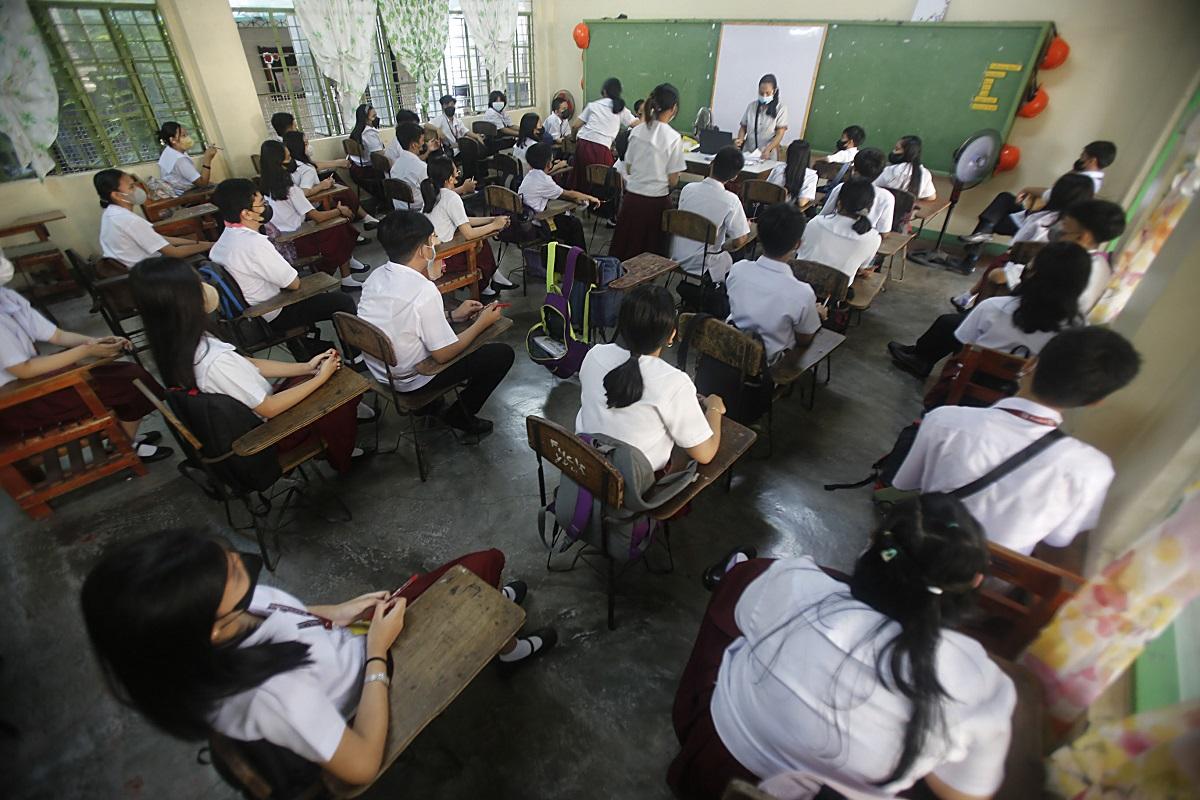Manila, Makati public schools limit face-to-face classes amid severe heat

The Schools Division Office (SDO) of Manila has released a memorandum ordering public schools to conduct classes only from 6 a.m. to 12 p.m. until next month amid the scorching heat being felt in the country.
The division memorandum dated April 8 and signed by SDO Manila’s chief education supervisor, Nerissa Lomeda, stated that all public schools in Manila City shall implement the adjusted class schedule from April 11 to May 28, 2024.
This was “in view of the onset of summer season where dangerous level of heat index is expected.”
Heat index is the measure of the temperature that a person feels, which is different from the actual air temperature, PAGASA said. It is computed by factoring in the humidity as well as air temperature.
In areas experiencing dangerous level heat index, which is from 42°C to 51°C, heat cramps and heat exhaustion are likely.
Symptoms of heat-related illnesses include sweating heavily, exhaustion or fatigue, dizziness or lightheadedness, blacking out or feeling dizzy when standing, weak but fast pulses, feeling of nausea, and vomiting.
Unified implementation
Meanwhile, Manila's SDO said that the unified implementation scheme was an offshoot of the consultative meetings held with various education stakeholders, “in careful consideration” of all the related issuances by the Department of Education (DepEd).
DepEd Assistant Secretary Francis Bringas earlier said that regional directors and superintendents have the authority to move class schedules to early morning or late afternoon due to the intolerable heat in some schools.
He also said that outdoor activities may be omitted between 9:30 a.m. to 4 p.m. to prevent students from having direct exposure to sun.
In Manila’s case, public school district supervisors were engaged to provide technical assistants to schools to come up with re-programmed class schedules, including but not limited to blended modality.
Teachers are also still required to report to school, regardless of the implemented modality, to conduct online teaching, prepare activity sheets, check and record learners’ output, monitor learners’ progress, or fulfill year-end tasks.
Makati City
Makati City schools also began shortening their classes on Monday as part of the local government’s contingency measures against the extreme heat.
For those taking the morning shift, classes have been adjusted from 6 a.m. to 10 a.m. while the afternoon shift was set from 3:30 p.m. to 7:30 p.m.
“Habang pinaiikli ang mga klase, pinapaalalahanan ang mga magulang na masigasig na subaybayan at isumite sa tamang oras ang activities ng mga anak araw-araw,” the city government said.
(While classes are being shortened, parents are reminded to diligently monitor and submit their children's activities on time daily.)
DepEd has given school heads the authority to decide on their own if face-to-face classes need to be suspended in their respective schools due to hot temperatures aggravated by the El Niño phenomenon.
Students and teachers could also wear more comfortable clothing in schools—which is subject to dress codes—in an effort to counter the heat.
Vice President and Education Secretary Sara Duterte said Monday that there is no need for schools to implement make-up classes after face-to-face classes were suspended in some areas in the past few days due to the hot weather.
If anyone is experiencing heat stroke symptoms, the Department of Health (DOH) advised concerned individuals to follow these first aid measures:
- move the person to a shaded, cool area, and provide ventilation.
- remove the person’s outer clothing.
- apply cold compresses, ice packs, cold water, or cold wet cloth against the skin, especially on the head, face, neck, armpits, wrists, ankles, and groin.
- if the patient is conscious, encourage frequent slow sips of cool water.
- contact emergency services or bring the person to the hospital immediately
Meanwhile, Manila 3rd District Representative Joel Chua recommended the creation of a warning system for hot temperatures similar to tropical cyclones.
'''Pag Signal Number 2, pag pumapalo na sa 41°C, 42°C dapat elementary hanggang Grade 6 dapat wala nang pasok. Dapat ang mga senior dapat hindi na pinalalabas lalo yung mga may comorbidity,” Chua said in Ivan Mayrina’s “24 Oras” report.
(If the heat index reaches 41°C to 42°C, classes in elementary should be suspended. Senior citizens and those with comorbidities should also be prohibited from going out.)
State weather bureau PAGASA said it was open to the recommendation.
“Ang worry lang po actually natin, limited po ang mga stations ng PAGASA. Kailangan namin ng assistance pa rin ng mga local government units, and even yung mga other mandated agencies,” said PAGASA Deputy Administrator for Research and Development Marcelino Villafuerte II.
(Our worry is that we have limited stations in PAGASA. We need assistance from LGUs and other agencies.)
“Puwede po actually balangkasin together with DepEd,” Villafuerte added.
(We can plan this together with DepEd.) — Giselle Ombay and Sundy Locus/VAL/VBL, GMA Integrated News



